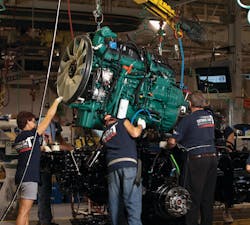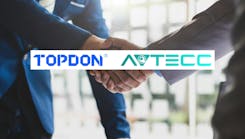Volvo Trucks named first U.S. manufacturer to achieve dual energy certifications
Volvo Trucks' New River Valley (NRV) assembly plant in Dublin, Va. is the first U.S. facility to be certified to the ISO 50001 standards under a pilot program supported by the U.S. Department of Energy (DOE). NRV is also the first Superior Energy Performance (SEP)-certified facility to use ISO 50001 as its energy management system standard. ISO 50001 and SEP are, respectively, the top international standard and top U.S. certification program for driving continuous improvements in energy efficiency.
NRV is certified to ISO 50001 in the U.S. under the pilot American National Standards Institute (ANSI)-ASQ National Accreditation Board (ANAB) accreditation and the first facility SEP-certified to use ISO 50001 under a new pilot ANSI-ANAB accreditation. NRV was SEP certified at a platinum level – the highest available – for improving energy performance by more than 15 percent during the three-year period after establishing an energy baseline.
These certifications will help the NRV plant further reduce its energy intensity to ultimately become carbon neutral. ANAB and ANSI assess and accredit the certification bodies that audit for compliance with SEP and ISO 50001. Volvo, in conjunction with certification/verification body DEKRA, is the first organization to complete the joint ANSI/ANAB ISO 50001/SEP certification pilot program.
"SEP and ISO 50001 certifications are an honor and a direct reflection of the environmental commitment of our entire organization," said Lars Blomberg, Volvo Trucks vice president and general manager of the NRV assembly plant. "These certifications required a high degree of cooperation – a total plant effort. Employees at all levels have been actively engaged throughout our entire energy reduction journey."
Established by the U.S. Department of Energy, the new SEP certification program provides a pathway for continuous energy efficiency improvements. The program is a transparent, nationally accepted system for verifying improvements in energy performance and management.
To earn SEP certification, facilities must also conform to the ISO 50001 energy management standard, the new international framework for organizations to implement an energy management system. NRV was previously certified to ISO 14001 environmental and ISO 9001 quality standards. Achieving the ISO 50001 and SEP standards mark the latest milestones on NRV's path to carbon neutrality.
The certifications come less than a year after NRV became the first of 32 major companies participating in DOE's Better Buildings/Better Plants program, formerly the Save Energy Now LEADER Program, to fulfill its 10-year pledge to reduce the intensity of energy per unit by 25 percent. Volvo met the program's target in one year instead of ten. While technologies like building automation systems, solar hot water heaters and infrared heaters helped drive NRV's energy reductions, many of the energy-saving ideas have come from employees
"All layers of our organization are dedicated to lean concepts and implementing new ways to reduce energy," Blomberg said. "Reducing energy while improving efficiency has helped us remain very competitive during a time when some companies are moving their manufacturing operations to lower cost environments."
"Congratulations to all the NRV employees for their many contributions to help achieve these leading-edge energy certifications," said Ron Huibers, president, Volvo Trucks North American Sales & Marketing. "The lean, energy-focused culture and total commitment to NRV's carbon-neutral initiative is evident through the achievement of these two national certifications."
"The tremendous energy reduction efforts at NRV have really resonated with our customers visiting the plant as well. They know their Volvo trucks are fuel efficient and they can see how that care for the environment is intertwined throughout the Volvo culture and manufacturing process," Huibers said.
Every Volvo truck sold in North America is assembled in the U.S. at the NRV plant. Since introducing Volvo D11, D13 and D16 engines with SCR aftertreatment technology to meet current EPA standards, Volvo Trucks has continued to advance its fuel-efficiency leadership, with near-zero regulated emissions.


